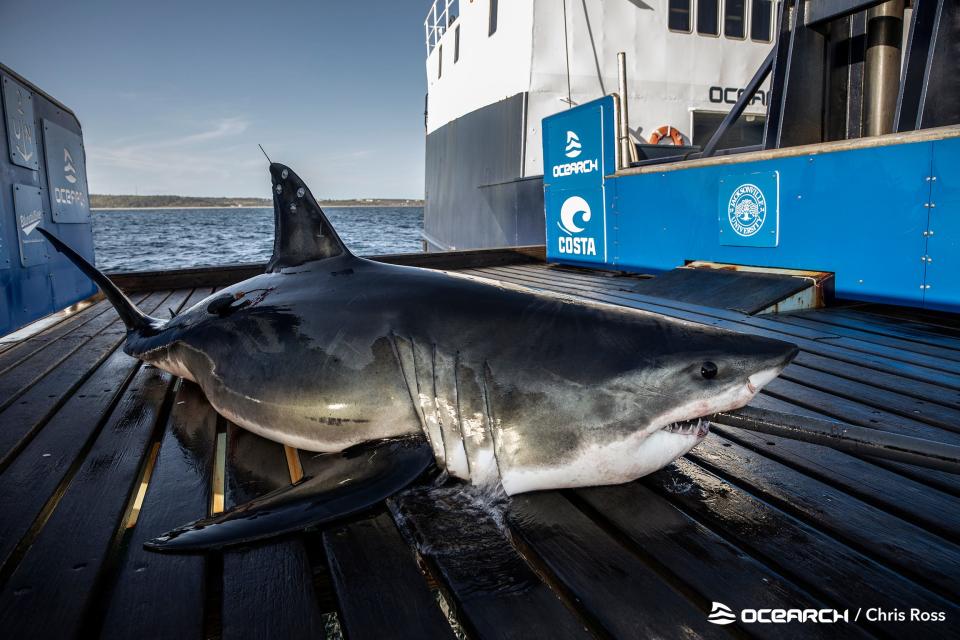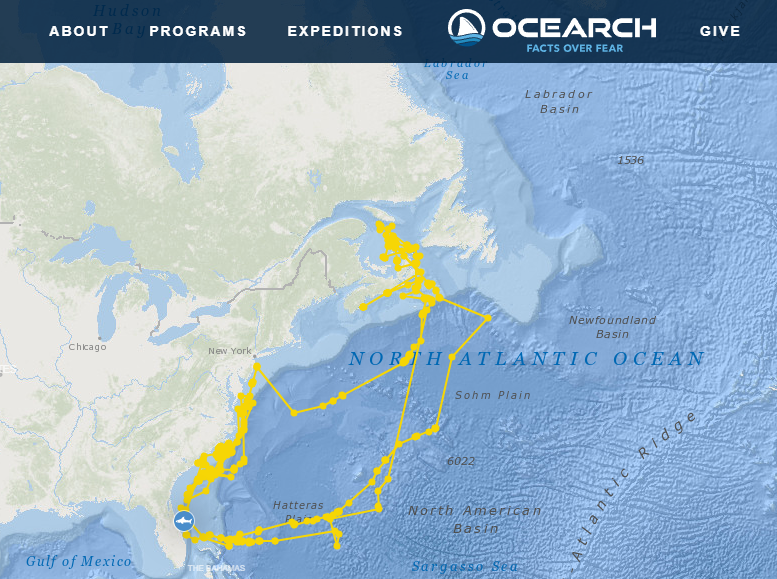Something fishy is going on in Southwest Florida waters.
On Wednesday, a 9-foot great white shark surfaced southwest of Marco Island far off the coast for the second time in two days and the fourth time this year.
The shark, named “Keji” by OCEARCH scientists who tagged him off Nova Scotia in 2021, pinged at 2:28 p.m., which means the tag attached to its dorsal fin surfaced long enough to transmit location information.
Keji has been hanging around the edge of the West Florida Escarpment this week, a 560-mile-long cliff in the Gulf of Mexico, where the seafloor plunges from just over 300 feet to nearly 10,000 feet deep. The escarpment is between 155 to 215 miles off the coast.
According to its OCEARCH tracker, Keji previously pinged off Marco Island on Feb. 4 and Feb. 16 and May 6 and appears to be heading back up north, a trip the shark has made annually after overwintering in Florida since it was tagged in 2021.
Keji’s pings show the shark arriving in Florida late last year, with its first ping southeast of St. Augustine on November 30, near the Florida Keys on Dec. 13, off Marco Island in February, Panama City Beach March 15, near Port Fourchon, Louisiana on April 11 and off St. George Island on April 22.
North Atlantic white sharks are known to migrate south from the waters around New England and Canada during winter in search of warmer waters and more abundant food sources and travel up North again this time of the year.
Here’s what to know about Keji, OCEARCH and great white sharks in Florida:
More about OCEARCH white shark Keji
Keji was tagged by OCEARCH near Ironbound Island Nova Scotia on Sep. 22, 2021. At the time, the male juvenile white shark measured 9 feet 7 inches and weighed 578 pounds.
Great white sharks can grow up to 20 feet long, but most are smaller with adult females averaging 15-16 feet and males 11-13 feet long.
Keji was named after the Kejimkujik National Park and National Historic Site in the region where he was tagged, according to OCEARCH.

What does OCEARCH do for great white sharks?
OCEARCH is a nonprofit research organization studying the ocean’s giants.
The group studies keystone species, including great white sharks, essential for the health of the oceans.
“At OCEARCH, we’re on a mission to solve the Global White Shark Puzzle. There are nine populations of white sharks across the globe and OCEARCH’s goal is to assist regional scientists to better understand the life of the white shark in each of these populations,” the group’s website states.
OCEARCH was due to launch its 47th expedition on April 1 but canceled it due to delays in the repair and maintenance of its research vessel M/V OCEARCH, according to a post on X, formerly Twitter.
Instead, scientists plan to head to Europe this summer for Expedition Save the Med.
Scientists plan to travel to Spain, France and Ireland aboard the research vessel M/V OCEARCH to study the Mediterranean Sea great white shark population. Expedition Save the Med is planned for July 29 to September 23.
“Ruthlessly persecuted. Completely misunderstood. Now critically endangered. OCEARCH is traveling over 4,000 miles to explore European waters and study the Mediterranean white shark population. A study of this kind has never been done before,” the group posted on its website.
OCEARCH is giving away a Europe trip, chance to ‘meet’ shark
Make a donation to OCEARCH or fill out a registration form to be entered into the “Meet a Shark” sweepstakes and a chance to win a trip to Europe and “meet” a great white shark. No purchase is necessary, according to the official sweepstakes rules.
The grand prize winner and a guest get a 5-day, 4-night trip to Spain, France or Ireland with airfare and hotel included and have a chance to join OCEARCH scientists on their research vessel during the shark-tagging Expedition Save the Med.
The sweepstakes started on May 1 and eligible entries must be received by 11:59 p.m. on August 5, 2024.
Entrants must be 21 or older and legal residents of the United States, Canada (excluding Quebec), the UK or Ireland.
Winners will be determined by random drawing. Official rules are available at meetashark.com.
OCEARCH shark tracker: One shark ‘drew’ a shark portrait
OCEARCH provides an online map tracking the tagged sharks’ travels.
Each animal has a Smart Position and Temperature Transmitting Tag (SPOT) tag attached to its dorsal fin which emits a ping when it breaks the water’s surface for a short time and transmits location information to trackers.
The most notable tracker page belongs to a 13-foot 3-inch white shark nicknamed Breton. The 1,437-pound shark’s pings from September 2020 to January 2022 connect to show what appears to be the outline of a colossal shark, with the tail in Nova Scotia, the body spanning the East Coast and the head pointing at Florida’s east coast.


How many sharks has OCEARCH tagged?
According to its tracker, OCEARCH has tagged 371 sharks, including 123 great white sharks.
The group has also tagged alligators, dolphins, seals, swordfish and turtles.
Great white sharks in Florida
Great white sharks migrate south when the water gets cold and food sources become scarce up north, according to OCEARCH chief scientist Dr. Bob Hueter.
Think of them as the snowbirds of sharks.
Most of them tend to stay away from the beaches in continental shelf waters, Hueter said.
There were 69 documented unprovoked shark attacks around the globe in 2023. The U.S. led the world with 36 attacks and Florida again was the state with the most bites at 16.
Florida shark attacks by county from 1882-present:
-
Volusia: 351
-
Brevard: 158
-
Palm Beach: 83
-
St. Johns: 45
-
Duval: 46
-
Martin: 41
-
St. Lucie: 39
-
Indian River: 22
-
Monroe: 21
-
Miami-Dade: 20
-
Broward: 16
-
Pinellas: 15
-
Bay: 9
-
Collier: 8
-
Lee: 8
-
Sarasota: 7
-
Flagler: 6
-
Escambia: 7
-
Nassau: 8
-
Okaloosa: 4
-
Manatee: 5
-
Gulf: 2
-
Franklin: 2
-
Walton: 1
-
Charlotte: 1
-
Santa Rosa: 1
While the U.S. has the most attacks, South Africa has the most shark-related fatalities.
Of the 949 global shark attacks recorded by Shark Attack File, great white sharks were credited as the top biters. However, no white shark has been identified in a Florida shark bite since 1926.
Support local journalism by subscribing to a Florida news organization.
This article originally appeared on Fort Myers News-Press: Florida great white sharks: OCEARCH shark pings off Marco Island again
Source Agencies

